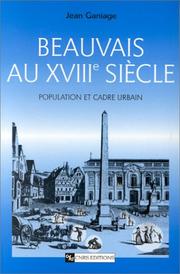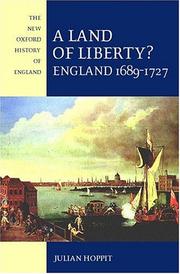| Listing 1 - 6 of 6 |
Sort by
|
Book
ISBN: 2859442618 9791035104597 Year: 1994 Volume: 29 Publisher: Paris Publications de la Sorbonne
Abstract | Keywords | Export | Availability | Bookmark
 Loading...
Loading...Choose an application
- Reference Manager
- EndNote
- RefWorks (Direct export to RefWorks)
Les collègues et amis de Jean Jacquart se sont associés pour offrir ce volume d’hommage, qui est d’abord un livre d’histoire. On y voit que Paris n’est pas seulement une capitale de pierre et de béton mais aussi une campagne. Avant que l’urbanisation du dernier siècle ne submerge tout, la capitale était ceinturée de plantureuses campagnes, couvertes de blé, de vignes, de prairies, de forêts. Sans céréales, sans vin, sans animaux de chasse, de pêche ou d’élevage à proximité, jamais une telle ville n’aurait pu se construire et travailler. On a aujourd’hui oublié la difficulté de nourrir régulièrement les grands ensembles urbains à l’époque préindustrielle et l’étonnante richesse des campagnes d’Ile-de-France. On a plus encore oublié les difficultés techniques et climatiques du labeur paysan, les calamités agricoles, les récoltes irrégulières et les disettes. La terre et ses ruraux, la ville et ses citadins, les activités commerciales et administratives d’une capitale incomparable sont ici tour à tour présentées. C’est cette nécessaire imbrication de la ville et de ses campagnes, avec quelques comparaisons françaises ou étrangères que rend palpable cet hommage à Jean Jacquart. La fécondité de l’œuvre de Jean Jacquart. historien du monde rural et de Paris, universitaire, président de la Fédération des Sociétés Savantes de Paris et de l’Ile-de-France est ici éclatante. Ces études nous parlent d’une seule voix d’un monde que nous avons perdu et d’un temps qui a marqué de façon indélébile le visage de Paris et les paysages familiers des Franciliens. Ce volume est un complément idéal de l’œuvre de Jean Jacquart : Paris et l’Ile-de-France au temps des paysans (xvie-xviie siècles). parue en 1990 chez le même éditeur.
Paris (France) --- History --- Mauritius --- France --- Civilization --- géographie rurale --- paysannerie --- condition sociale --- condition économique --- vie rurale --- vie urbaine --- relation ville-campagne --- condition rurale --- campagne --- FRANCE --- PARIS (FRANCE) --- CHEVAUX --- EQUITATION --- CADASTRES --- ECONOMIE RURALE --- HISTOIRE RURALE --- CONDITIONS SOCIALES --- 17E-18E SIECLES --- CONDITIONS ECONOMIQUES --- HISTOIRE --- 16E-18E SIECLES --- 15E-19E SIECLES

ISBN: 2271056349 2271078350 9782271056344 Year: 1999 Publisher: Paris: CNRS,
Abstract | Keywords | Export | Availability | Bookmark
 Loading...
Loading...Choose an application
- Reference Manager
- EndNote
- RefWorks (Direct export to RefWorks)
Beauvais is in the XVIII th century an important textile centre around control a wide wool area. But this medium-sized town, of around 12,000 inhabitants, had not, like many others, been the subject of a systematic urban population approach. The demographic study proposed here by Jean Ganiage is based on an exhaustive analysis of the old civil status. In addition to detailed analyses of nuptiality, birth rate, fertility and mortality, and sometimes very lively reconstructions of the city and its inhabitants, the author highlights, in a significant way, a rapid decrease in the population. fertility from the middle of the 18th century. At the end of the reign of Louis XV the city had just repaired the losses that had put him through the crises of the late XVII th century.
Beauvais (France) --- Population --- History --- Economic conditions --- Population. --- Economic history. --- France--Beauvais. --- History, Economic --- Economics --- Human population --- Human populations --- Population growth --- Populations, Human --- Human ecology --- Sociology --- Demography --- Malthusianism --- Beauvais (France) - Population - History --- Beauvais (France) - Economic conditions - 18th century --- société urbaine --- Beauvais --- population --- BEAUVAIS (FRANCE) --- DEMOGRAPHIE --- DEMOGRAPHIE HISTORIQUE --- FRANCE --- CONDITIONS SOCIALES --- 18E SIECLE --- 16E-18E SIECLES --- HISTOIRE URBAINE --- 17E-18E SIECLES

ISBN: 0521830605 0521036194 1107138892 0511179243 0511062915 0511306288 0511490534 1280421738 0511203160 051107137X 9780511062919 9780511071379 9780511490538 9780521830607 9781107138896 9781280421730 9780511179242 9780511203169 9780511306280 9780521036191 Year: 2003 Volume: 68 Publisher: Cambridge ; New York : Cambridge University Press,
Abstract | Keywords | Export | Availability | Bookmark
 Loading...
Loading...Choose an application
- Reference Manager
- EndNote
- RefWorks (Direct export to RefWorks)
Self-Interest before Adam Smith inquires into the foundations of economic theory. It is generally assumed that the birth of modern economic science, marked by the publication of The Wealth of Nations in 1776, was the triumph of the 'selfish hypothesis' (the idea that self-interest is the motive of human action). Yet, as a neo-Epicurean idea, this hypothesis had been a matter of controversy for over a century and Smith opposed it from a neo-Stoic point of view. But how can the Epicurean principles of orthodox economic theory be reconciled with the Stoic principles of Adam Smith's philosophy? Pierre Force shows how Smith's theory refutes the 'selfish hypothesis' and integrates it at the same time. He also explains how Smith appropriated Rousseau's 'republican' critique of modern commercial society, and makes the case that the autonomy of economic science is an unintended consequence of Smith's 'republican' principles.
Economics --- -Economic theory --- Political economy --- Social sciences --- Economic man --- History --- Social Sciences --- Political Science --- History. --- AA / International- internationaal --- 330.00 --- 330.40 --- 174 --- Economische en sociale theorieën: algemeenheden --- Geschiedenis van het economisch en sociaal denken --- Verband tussen de ethiek en de economie. Ethiek en bedrijf --- -History --- ECONOMIE POLITIQUE --- PASSIONS DANS LA LITTERATURE --- PASSIONS (PHILOSOPHIE) --- HISTOIRE --- 17E-18E SIECLES --- Historical school of economics.

ISBN: 128037537X 9786610375370 0585486247 9780585486246 9781280375378 0198228422 0199251002 6610375372 9780198228424 9780199251001 Year: 2000 Publisher: Oxford [England] : New York : Clarendon Press ; Oxford University Press,
Abstract | Keywords | Export | Availability | Bookmark
 Loading...
Loading...Choose an application
- Reference Manager
- EndNote
- RefWorks (Direct export to RefWorks)
Regions & Countries - Europe --- History & Archaeology --- Great Britain --- England --- History --- Civilization --- GRANDE-BRETAGNE --- ANGLETERRE --- HISTOIRE --- 1689-1702 (GUILLAUME III ET MARIE II) --- 1702-1714 (ANNE) --- 1714-1727 (GEORGE IER) --- CIVILISATION --- 18E SIECLE --- 17E SIECLE --- 17E-18E SIECLES --- Civilisation --- XVIIe-XVIIIe s. -- 1601-1800 --- Grande-Bretagne

ISBN: 0585351953 9780585351957 9780300147568 0300147562 0300064780 0300080859 9780300064780 0300064780 Year: 1999 Publisher: [Place of publication not identified] Yale University Press
Abstract | Keywords | Export | Availability | Bookmark
 Loading...
Loading...Choose an application
- Reference Manager
- EndNote
- RefWorks (Direct export to RefWorks)
Although the French Revolution is associated with efforts to dechristianize the French state and citizens, it actually had long-term religious-even Christian-origins, claims Dale Van Kley in this controversial new book. Looking back at the two and a half centuries that preceded the revolution, Van Kley explores the diverse, often warring religious strands that influenced political events up to the revolution.Van Kley draws on a wealth of primary sources to show that French royal absolutism was first a product and then a casualty of religious conflict. On the one hand, the religious civil wars of the sixteenth century between the Calvinist and Catholic internationals gave rise to Bourbon divine-right absolutism in the seventeenth century. On the other hand, Jansenist-related religious conflicts in the eighteenth century helped to "desacralize" the monarchy and along with it the French Catholic clergy, which was closely identified with Bourbon absolutism. The religious conflicts of the eighteenth century also made a more direct contribution to the revolution, for they left a legacy of protopolitical and ideological parties (such as the Patriot party, a successor to the Jansenist party), whose rhetoric affected the content of revolutionary as well as counterrevolutionary political culture. Even in its dechristianizing phase, says Van Kley, revolutionary political culture was considerably more indebted to varieties of French Catholicism than it realized.
Regions & Countries - Europe --- History & Archaeology --- France --- Christianity and politics --- Secularism --- Church and state --- Ethics --- Irreligion --- Utilitarianism --- Atheism --- Postsecularism --- Secularization (Theology) --- Christianity --- Church and politics --- Politics and Christianity --- Politics and the church --- Political science --- History --- Political aspects --- Religious aspects. --- Church history --- Religious history --- EGLISE ET ETAT --- FRANCE --- CHRISTIANISME ET POLITIQUE --- JANSENISME --- HISTOIRE --- HISTOIRE RELIGIEUSE --- 17E-18E SIECLES --- 1789-1799 (REVOLUTION) --- CAUSES --- 16E-18E SIECLES --- 18E SIECLE
Book
ISBN: 2859442472 2859448454 Year: 1994 Volume: 27 Publisher: Éditions de la Sorbonne
Abstract | Keywords | Export | Availability | Bookmark
 Loading...
Loading...Choose an application
- Reference Manager
- EndNote
- RefWorks (Direct export to RefWorks)
À cause de sa situation frontalière, la Champagne des XVIe et XVIIe siècles revêt une importance stratégique de premier ordre pour la monarchie. Afin d'en organiser la défense pour protéger le coeur de son royaume, François I er confie à quelques nobles provinciaux, dès les années 1530, de solides pouvoirs militaires tout en les comblant de faveurs pour s'en attacher la loyauté. Cette « noblesse seconde », qui connaît bien le terrain et les réseaux nobiliaires de son pays, parvient très vite à se rendre indispensable, car au cours des guerres de religion, elle réussit à préserver l'influence du roi en Champagne. Étoffée et soutenue par la couronne jusqu'au premier tiers du XVIIe siècle, elle est alors le relais essentiel entre l'État, les grands et les gentilshommes ruraux, animée par une conception du pouvoir qui conjugue la protection de son territoire et la fidélité envers le souverain. Les premières atteintes à son prestige régional se produisent à l'époque de richelieu, même si elle joue encore un rôle déterminant pour encadrer l'armée qui doit faire face aux Habsbourg dans le Nord-Est. Dès lors, et malgré la Fronde, qui la rétablit un temps comme pilier de l'autorité royale en Champagne, elle ne parvient pas à s'intégrer solidement dans les nouveaux rouages de l'absolutisme. Sous Louis XIV, alors que les conflits s'éloignent, la noblesse seconde se voit contrainte de prendre part à des opérations qui la déracinent de ses terres. Elle se dilue ainsi dans les troupes du roi et perd ce qui faisait jusqu'alors son originalité : le pouvoir local. Étayé par les sources les plus diverses, cet ouvrage balise des pistes nouvelles permettant de mieux comprendre le rôle politique tenu par la noblesse au cours de la première modernité.
Nobility --- Noblesse --- Genealogy --- Généalogie --- France. --- Officers --- Biography --- Champagne-Ardenne (France) --- France --- History --- History, Military --- Court and courtiers --- Political activity --- Histoire --- Histoire militaire --- Cour et courtisans --- Activité politique --- Genealogy. --- Généalogie --- Activité politique --- Political activity. --- History. --- History, Military. --- France combattante. --- Bro-C'hall --- Fa-kuo --- Fa-lan-hsi --- Faguo --- Falanxi --- Falanxi Gongheguo --- Faransā --- Farānsah --- França --- Francia (Republic) --- Francija --- Francja --- Francland --- Francuska --- Franis --- Franḳraykh --- Frankreich --- Frankrig --- Frankrijk --- Frankrike --- Frankryk --- Fransa --- Fransa Respublikası --- Franse --- Franse Republiek --- Frant︠s︡ --- Frant︠s︡ Uls --- Frant︠s︡ii︠a︡ --- Frantsuzskai︠a︡ Rėspublika --- Frantsyi︠a︡ --- Franza --- French Republic --- Frencisc Cynewīse --- Frenska republika --- Furansu --- Furansu Kyōwakoku --- Gallia --- Gallia (Republic) --- Gallikē Dēmokratia --- Hyãsia --- Parancis --- Peurancih --- Phransiya --- Pransiya --- Pransya --- Prantsusmaa --- Pʻŭrangsŭ --- Ranska --- República Francesa --- Republica Franzesa --- Republika Francuska --- Republiḳah ha-Tsarfatit --- Republikang Pranses --- République française --- Tsarfat --- Tsorfat --- Γαλλική Δημοκρατία --- Γαλλία --- Франц --- Франц Улс --- Французская Рэспубліка --- Францыя --- Франция --- Френска република --- פראנקרייך --- צרפת --- רפובליקה הצרפתית --- فرانسه --- فرنسا --- フランス --- フランス共和国 --- 法国 --- 法蘭西 --- 法蘭西共和國 --- 프랑스 --- France (Provisional government, 1944-1946) --- Champagne-Ardenne, France --- Champagne (France : Province) --- Grand Est (France) --- François 1er --- Champagne --- noblesse seconde --- FRANCE --- CONDITIONS SOCIALES --- NOBLESSE --- HISTOIRE --- 16E-17E SIECLES --- 16E-20E SIECLES --- 13E-16E SIECLES --- 17E-18E SIECLES
| Listing 1 - 6 of 6 |
Sort by
|

 Search
Search Feedback
Feedback About UniCat
About UniCat  Help
Help News
News